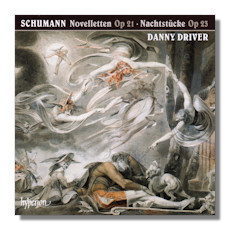
The Internet's Premier Classical Music Source
Related Links
- Schumann Reviews
- Latest Reviews
- More Reviews
-
By Composer
-
Collections
DVD & Blu-ray
Books
Concert Reviews
Articles/Interviews
Software
Audio
Search Amazon
Recommended Links
Site News
 CD Review
CD Review
Robert Schumann

Novelletten & Nachtstücke
- Novelletten, Op. 21
- Nachtstücke, Op. 23
- Romance in F Sharp Major, Op. 28 #2
Danny Driver, piano
Hyperion CDA67983
Schumann had the extraordinary gift of distilling personal experience into music of the most sublime and universal appeal. British pianist Danny Driver, who studied with Alexander Kelly and Piers Lane whilst simultaneously gaining a first class degree in Natural Sciences at Cambridge University, also has the insight to render Schumann's less often-heard Novelletten, Opus 21, and Nachtstücke, Opus 23, appealing without the listener's necessarily knowing the relevant background of Schumann's life.
Melancholic and sensitive, the composer borrowed the title, "Night Pieces", from E.T.A. Hoffmann when he wrote them at the time of the death of his brother, Eduard, in 1839. He had a premonition of that event and its four pieces reflect the trauma and sense of loss. Yet the music as performed by Driver, is distanced from any need to understand these circumstances, even though it clearly originates (at least partially) in them.
With over two dozen versions of this work available, Driver's is unlikely to be an automatic first choice (Kempff's on Deutsche Grammophon 4778693 might be). But he plays idiomatically and with sensitivity. Although his tempi and phrasing don't always convey the depth of the music. It's true that the opening funeral procession [tr.9] should suggest hesitancy, and reluctance. Yet Driver seems to get lost in the halting nature of the final sections. Almost as though his playing is trying to peer too far into Schumann's mind on our behalf; and as though he is not concentrating enough on the sheer interpretation of the composed work.
At the same time, Driver enters almost without reservation into the magical atmosphere that only Schumann can create – and which slowly creeps up on the listener… as is evident in the lovely "Einfach" ("simple", "easy") movement, [tr.12]. Really compelling performances (of which this is not an example, good though it is) give the impression that the music will play itself if given just the lightest push. This is not Driver's way. Although he doesn't impose his will or style on the music, he does go a little too far in forcing it into places where it does not naturally want to go.
The Novelletten are altogether more cheerful, though hardly trite, works. Another Clara (than the love of Schumann's life), English singer Clara Novello seems to have inspired their title. The eight pieces which occupy the first nearly 48 minutes of this CD were, though, written – as was so much of Schumann's music – for Clara Wieck, also in 1838. It's effectively the largest of the composer's least often played piano cycles (there are, though, a dozen and a half recordings of the work in the current catalog) and has much exaltation and delight integral to its conception and content.
Driver captures this; though he does not consistently convey Schumann's carefree mood as heartily as could have been done. Some of the movements are played with too much marching and mechanics in mind… the fifth, "Rauschend und Festlisch" [tr.5] lacks spontaneity and joie de vivre, for instance. At times one hears an inexperienced pianist in a hurry. The acts of lingering, savoring and weighing in the palm of one's hand have much to recommend them with Schumann. Driver's style is more snappy and crisp. His very ending for example, seems to be a relief more than a fully controlled celebration or culmination.
On the other hand where tenderness and witholding of emotion are required, Driver hints at, rather than overplays feeling. This will suit many; though his is not full-blown Romanticism. The performances never reach a point where you feel Driver is playing more automatically than passionately. The technical challenges (especially the very Schumannesque runs) he copes with admirably; he maintains the movement and color in the face of the requirement that the music must not collapse under its own emotional weight.
Also on the CD is the Romance in F Sharp Major, Opus 28/2, a short piece at under four minutes, and the middle of three works written as Opus 28 at the same time as the others here. It was composed after Schumann had devoted a long period to the solo piano and may be seen as a farewell to the genre, ending in a lullaby-like gentle rocking. Driver leaves us poised nicely between regret and resignation. That same beautiful simplicity which ends the Nachtstücke is also achieved here, though with just that same hint of effort, when the really great performers seem to leave the music to its own devices.
The acoustic of Potton Hall, Dunwich (Suffolk) is clean and responsive, concentrating our attention on the keys and not the event. The piano is forward; just what is needed. Misha Donat's notes on these neglected yet rewarding works by Schumann are informative and set the scene for perhaps not the most recommendable version, but one which has its strong points.
Copyright © 2014, Mark Sealey




















